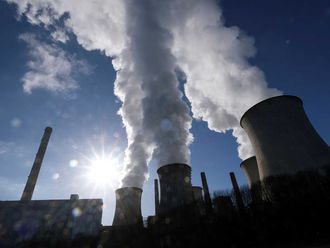Taormina: Group of Seven chiefs are preparing to sign off on a substantially pared-down statement at the close of their meeting, an indication of persisting divisions on climate change and trade between Donald Trump and the six other leaders.
The final communique — 32 pages last year — traditionally outlines the common positions on the economy and global issues requiring joint action from the G7’s like-minded allies. This year’s document is poised to be one-third the length of last year’s in Japan, according to three officials involved in the preparation. One official said it may only be six pages long.
While the leaders quickly agreed on antiterrorism measures in a show of unity after a suicide bomb attack in Manchester this week, climate emerged as the foremost stumbling block. German Chancellor Angela Merkel said Trump was isolated during a “very intense exchange” as the other six nations pressed him to maintain his Paris climate commitments. The G7 also faces difficult talks on trade with Trump, she said.
The two-day summit at the Sicilian resort town of Taormina presents a new dynamic for the bloc and its shifting sands. Like Trump, France’s Emmanuel Macron, the UK’s Theresa May and Italy’s Paolo Gentiloni are all at their first G7.
It’s possible the final communique issued at the close on Saturday will see all G7 nations except the US pledge action on climate change, a Canadian government official said during a briefing early Friday.
Short and strategic
The shorter communique isn’t all bad. One G7 official said the brevity was a positive development that allows focus and avoids the document ballooning out of control. The pared-down draft nonetheless reflects the difficulty in bridging a divide with a US president elected on an “America First” platform that tears up many long-held positions and casts doubt on future cooperation. Trump admonished Nato leaders Thursday in Brussels and also took a pop at Germany’s trade surplus.
The shortest leaders’ communique was issued in 1975, the first year of the summit, totalling 1,129 words, according to John Kirton, director of the University of Toronto’s G7 Research Group. The summits of 1976 and 1982 each came in under 1,800 words while the longest was 38,517 words in 2004, hosted by George W. Bush.
“You can test this stuff empirically. A shorter communique tends to mean the less they actually produce by way of commitments,” Kirton said in an interview. He downplayed the relative scale of divisions.
“I don’t think it’s more divided than it’s ever been before,” he said, citing the 1982 summit as a failure where the issue of a Soviet gas pipeline, opposed by Ronald Reagan, divided the countries. “So they patched over some communique, but then they all ran off to their post-summit briefings and said ‘we don’t agree with it, we don’t agree with it.’ So it made things worse. They kind of publicised their failure.”
Counter-terrorism
Drafts of the communique as of Friday were due to address topics such as migration and gender equality. The “ongoing large-scale movement” of migrants and refugees calls for “coordinated efforts,” according to a draft seen by Bloomberg News. The drowning of dozens of migrants in the Mediterranean this week underscored the urgency of the task.
“We reaffirm the sovereign rights of states to control their own borders and set clear limits on net migration levels, as key elements of their national security and economic well-being,” according to the draft.
The nations are also set to say gender equality is fundamental for human rights. The leaders issued a separate statement on counter-terrorism efforts that called on Google Inc., Facebook Inc. and other internet companies to do “substantially” more to take extremist material offline.
“Against the backdrop of Monday’s cowardly attack in Manchester, we have discussed what more we can do together to address the threat from terror,” May said. “Make no mistake, the fight is moving from the battlefield to the internet.”












